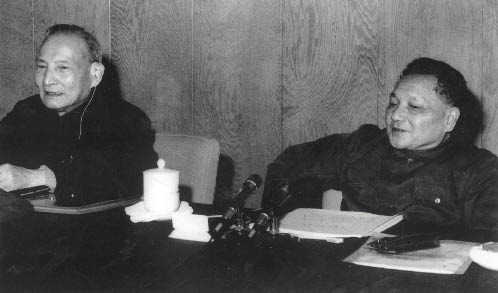| Deng Xiaoping's Third Comeback
By intern reporter ZHAO YAYUAN
 |
|
Deng Xiaoping (right) and Chen Yun at the Third Plenary Session of the 11th Central Committee of the CPC in Beijing, December 1978. Cnsphoto |
ON the evening of July 30,1977, Deng Xiaoping attended the closing ceremony of the International Football Friendship Invitational Tournament held at Beijing Workers' Stadium. It was his first public appearance following a third political comeback. As a football lover, Deng looked calm and detached, dragging on a stream of cigarettes as he enjoyed the match. The same day, Xinhua News Agency reported, "When Vice Chairman Deng Xiaoping and other leaders stepped into the VIP stand, they received prolonged applause from the 80,000-strong audience."
Deng Xiaoping, a legendary figure in the Chinese political arena, experienced several dramatic ups and downs during his long political career.
At the beginning of the 1930s, Deng Xiaoping was dismissed from his position because of his support for Mao Zedong. He later played a prominent role in the armed forces, making an important contribution to the Chinese People's War Against Japanese Aggression and the Liberation War. After the establishment of the People's Republic of China in 1949, he took up a leading role in southwest China. In 1952, Deng was transferred to the central leadership. In 1956 he was elected a member of the Standing Committee of the Political Bureau and general secretary of the Secretariat of the Central Committee of the Communist Party of China, becoming an important member of the first generation of central collective leadership with Mao Zedong as its core.
The "cultural revolution" was launched in 1966, and along with President Liu Shaoqi, Deng Xiaoping was criticized and ousted from all leading positions. He was sent to a county tractor factory in rural Jiangxi Province to labor as a common worker.
In 1973, Deng Xiaoping was appointed vice premier of the State Council. The following year, he represented the Chinese government at the Sixth Special Session of the U.N. General Assembly, and expounded Chairman Mao Zedong's theory on the division of the three worlds. In 1975, he took up the posts of vice chairman of the Central Committee, vice premier of the State Council, vice chairman of the Central Military Commission, and chief of the general staff of the People's Liberation Army. After Premier Zhou Enlai fell seriously ill, Deng started to preside over the day-to-day work of the Central Committee, the State Council and the People's Liberation Army with the support of Mao Zedong, and attempted to address the chaos caused by the "cultural revolution." In April 1976, however, the Gang of Four maneuvered to depose him a third time.
The Gang of Four were arrested in late 1976, and Deng returned to the leadership in July 1977. In August, he was elected vice chairman of the Central Committee. Later, he became chairman of the Central Military Commission and chairman of the Fifth National Committee of the Chinese People's Political Consultative Conference (CPPCC)
In December 1978, the Third Plenary Session of the 11th Central Committee of the CPC ushered in a new era of reform, opening-up and modernization. Deng Xiaoping played a decisive role in this historic change. At this plenary session, the second generation of central collective leadership with Deng Xiaoping as its core was formed.
Deng Xiaoping was the chief architect of China's reform and opening-up, and founded Deng Xiaoping Theory. Proceeding from actual conditions he put forward the concept of "one country, two systems." Hong Kong returned to China in 1997 under this model, and Macao also returned to China in 1999. |
